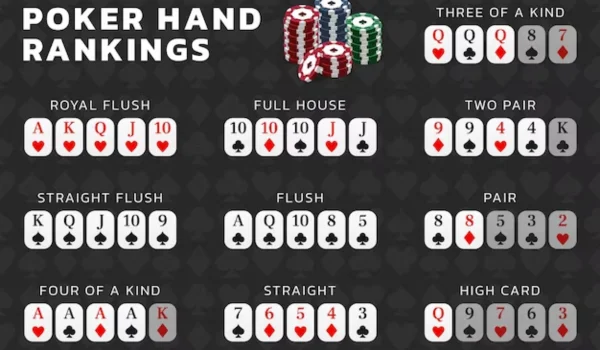Poker is a game that has captivated people for centuries. It combines strategy, skill, and a bit of luck, making it a thrilling and unpredictable experience.
However, beyond the rules and strategies, poker etiquette plays an essential role in creating a respectful and enjoyable atmosphere at the table.
In this article, we will explore the importance of poker etiquette and provide you with valuable insights on how to become a pro in this aspect of the game.
Why poker etiquette is important
Poker etiquette is not just about following a set of rules; it is about creating a positive and respectful environment for all players involved.
Whether you are playing a friendly game with friends or competing in a high-stakes tournament, adhering to proper poker etiquette shows your respect for the game and the people you are playing with.
It enhances the overall experience and ensures that everyone can enjoy the game to the fullest.
Additionally, practicing good poker etiquette can also benefit you in the long run.
When you display good manners and sportsmanship, you are more likely to be invited to future games or gain the respect of other players, which can lead to better opportunities and a more enjoyable poker journey.
 Basic poker etiquette rules
Basic poker etiquette rules
To start your journey towards becoming a pro in poker etiquette, it is crucial to understand and follow some basic rules.
Firstly, always be punctual. Arriving late disrupts the flow of the game and shows a lack of respect for your fellow players.
Secondly, always act in turn. Avoid making decisions or taking actions out of turn, as it can confuse other players and disrupt the game.
Furthermore, avoid excessive talking or distracting behavior when it is not your turn. While some friendly banter is part of the game, being excessively loud or disruptive can be disrespectful to others and hinder their focus. Lastly, be mindful of your personal hygiene.
The close proximity at the poker table requires good grooming and cleanliness to ensure a pleasant experience for everyone involved.
Proper behavior at the poker table
When it comes to proper behavior at the poker table, there are a few key points to keep in mind.
Firstly, always show respect towards the dealer and other players. Treat them with courtesy and avoid making derogatory or offensive comments. Remember, poker is a game where everyone should feel comfortable and respected.
Secondly, avoid engaging in table talk that may reveal information about your hand or strategy.
While it is natural to want to socialize and connect with other players, revealing too much can give away valuable information and compromise the integrity of the game. Keep the conversation light and neutral, focusing on topics unrelated to the ongoing hand.
Lastly, be mindful of your body language. Avoid excessive fidgeting, sighing, or showing frustration when experiencing a bad beat or a tough decision.
Maintaining a calm and composed demeanor not only reflects good sportsmanship but also prevents other players from gaining insight into your emotional state.
 Handling chips and cards with etiquette
Handling chips and cards with etiquette
The way you handle chips and cards at the poker table can speak volumes about your poker etiquette skills.
Firstly, always stack your chips neatly in front of you. This not only helps you keep track of your chip count but also allows other players to easily assess the size of your stack.
Avoid splashing the pot by throwing chips haphazardly, as it can create confusion and slow down the game.
When it comes to cards, always handle them with care. Avoid bending or folding the cards, as it can damage them and disrupt the game.
Additionally, ensure that your hole cards remain visible only to you and are not accidentally exposed to other players. Being mindful of your cards and treating them respectfully shows your commitment to fair play and sportsmanship.
In the realm of online poker, platforms like SA Gaming have taken these principles to the digital landscape.
They provide a user-friendly interface that mimics the real-world poker table experience, allowing players to stack their virtual chips neatly and interact with their digital cards with precision.
The incorporation of advanced technology by SA Gaming ensures that the online poker environment reflects the same level of respect and fairness observed in traditional poker settings.
Etiquette for betting and raising
Betting and raising are integral parts of poker, and understanding the proper etiquette in these situations is crucial.
Firstly, announce your actions clearly when betting or raising. This helps avoid any confusion or misunderstandings among the players. Additionally, avoid string betting, which is making multiple motions or declarations in an attempt to gauge the reaction of opponents similar with hack tài xỉu. This is considered poor form and can lead to penalties.
Secondly, avoid excessive celebration or taunting when you win a big pot or make a successful bluff.
While it is natural to feel excited or relieved, rubbing it in the faces of other players can create a hostile atmosphere and may result in retaliation. Show respect towards your opponents, regardless of the outcome of the hand.
Lastly, be mindful of your bet sizing. Avoid unnecessarily prolonging the betting process by continuously deliberating over your bet size.
Have a clear idea of what you want to bet or raise and execute it promptly. This helps maintain the flow of the game and shows respect for other players’ time.
Dealing with bad beats and losing gracefully
In poker, bad beats and losing streaks are inevitable. How you handle these situations demonstrates your level of poker etiquette and sportsmanship.
Firstly, avoid berating or criticizing other players after a bad beat. It is important to remember that poker is a game of chance, and luck can sometimes be on the side of your opponents. Instead, maintain a positive attitude and congratulate the winner on their success.
Secondly, avoid going on tilt. Tilt refers to a state of emotional frustration or anger that can cloud your judgment and lead to poor decision-making.
If you find yourself on the verge of tilting, take a break, step away from the table, and regain your composure. Returning to the game with a clear mind will help you make better decisions and prevent any negative impact on the atmosphere at the table.
Lastly, be gracious in both victory and defeat. Whether you win or lose, show respect towards your opponents and avoid gloating or sulking. Remember that poker is a game where luck plays a significant role, and maintaining a level-headed and respectful attitude will earn you the admiration of your fellow players.
 Etiquette for online poker games
Etiquette for online poker games
With the rise of online poker, it is essential to also consider the etiquette specific to this platform.
Firstly, ensure that you have a stable internet connection and a quiet environment to play in. Avoid playing in public places or places with excessive background noise, as it can be distracting to both you and other players.
Secondly, be mindful of your timing. Online poker games have a set time limit for each player’s turn, and consistently taking too long to act can slow down the game and frustrate other players. Make sure you are paying attention to the game and are ready to act when it is your turn.
Furthermore, avoid using the chat function to engage in unnecessary banter or arguments.
While friendly conversation is encouraged, online poker games can sometimes attract individuals who are looking to provoke or disrupt the game. Stay focused on the game and use the chat function responsibly.
Tips for improving your poker etiquette skills
Becoming a pro in poker etiquette requires practice and self-awareness. Here are some tips to help you improve your skills:
Observe experienced players: Watch how seasoned players conduct themselves at the table and learn from their example. Pay attention to their actions, body language, and interactions with others.
Study poker etiquette resources: There are numerous books, articles, and videos available that provide insights into proper poker etiquette. Take the time to educate yourself and stay updated on any changes or new practices.
Reflect on your own behavior: After each game, take a moment to reflect on your own conduct at the table. Did you display good etiquette? Were there any areas for improvement? By being self-aware, you can continuously strive to become a better player and a more respectful opponent.
Practice patience: Poker requires a great deal of patience. Cultivate this virtue both on and off the poker table. Avoid rushing decisions or displaying frustration when faced with challenging situations. Patience not only contributes to good etiquette but also improves your overall poker skills.
Seek feedback: Don’t be afraid to ask for feedback from other players or friends who have observed your behavior at the table. Constructive criticism can help you identify areas for improvement and refine your poker etiquette skills.
Conclusion and final thoughts
In conclusion, poker etiquette is an essential aspect of the game that every aspiring player should master.
By adhering to proper etiquette, you create a respectful and enjoyable atmosphere for yourself and others.
Remember to be punctual, act in turn, show respect towards dealers and players, handle chips and cards with care, and maintain a positive attitude in both victory and defeat.
Whether you are playing at a casino, a home game, or online, good poker etiquette will set you apart as a professional and respected player similar with Jili.
So, embrace these etiquette rules, practice them diligently, and watch as your poker journey takes a positive turn. Good luck and may the cards be in your favor!
